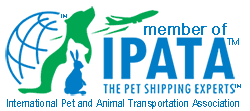We will get back to you as soon as possible
Please try again later
We will get back to you as soon as possible
Please try again later
Pet Relocation to South Africa
Important Guidelines for Pet Transportation to South Africa
Ensuring seamless pet transportation to South Africa requires adherence to specific guidelines. All pet veterinary health certificates bound for South Africa must undergo endorsement by USDA-APHIS, a crucial step that includes Service and Emotional Support Animals. Additionally, comprehensive disease testing, meeting specified test type requirements, is imperative as outlined on the veterinary health certificate. Non-compliance with these requirements may lead to the pet being returned to the U.S. or euthanized. It's essential to note that APHIS endorsement of the health certificate is mandatory, which follows issuance by a USDA Accredited Veterinarian. Furthermore, both issuance and endorsement of the health certificate must be completed within 10 days of the pet's intended travel date.

Relocating Pets Worldwide with Ease
Pet Travel Microchip & Vaccination Requirements
Dogs
Any U.S.-licensed rabies vaccine product is acceptable for use.
Rabies vaccination must be within 12 months of export, and more
than 30 days prior to export in the case of primary rabies vaccination (30-day waiting period does not apply if the booster was administered before the previous rabies vaccination expired). All columns of the table must be completed and match the information provided on the rabies certificate. The rabies certificate must be presented to the
APHIS office at the time of certificate endorsement, AND the original or a copy of the rabies vaccination certificate must accompany the health certificate.
U.S.-origin DOGS entering South Africa are required to test negative
for Trypanosoma evansi (surra) on BOTH the CATT and Giemsa
blood smear tests. All surra testing must occur at one of the two
internationally recognized OIE Reference Laboratories for surra
testing (see below for further instructions on sample submission
procedures).
ALL OTHER REQUIRED TESTS must be completed at an officially approved laboratory located in the United States.
The animal's microchip number MUST be recorded on ALL laboratory reports.
ONLY the following test methods are allowed, as outlined below:
- Brucella Canis: Serum agglutination (this is the ONLY acceptable
test method) - Trypanosmoa Evansi: BOTH Card agglutination test* AND
Giemsa blood smear*
*Both tests MUST be performed at an OIE Reference Laboratory
- Babesia Gibsoni: BOTH Immunoflouresence antibody test AND
Giemsa blood smear - Dirofilaria Immitis: Microfilarial filtration test (this is the ONLY
acceptable test method) - Leishmaniosis: Indirect fluorescent antibody test OR ELISA test
OR Direct agglutination test OR Western blot/membrane
immunoassay
Cats
Microchip is required
The vaccine used must be a strain of anti-rabies conforming to a potency standard recognized by the World Health Organization.
- The animal must have been vaccinated at least 30 days, but not longer than 12 months prior to export in the case of the primary
vaccination. - Animals under 3 months of age may not be vaccinated and are considered to have a valid vaccination provided the dam of the animal concerned was vaccinated at least 30 days, but not more than 12 months, prior to giving birth. Such animals must be vaccinated at 3 months of age against rabies in the Republic of South Africa and the owners must inform the South African Veterinary Authority.
A veterinary import permit is required for all cats traveling to S. Africa. Veterinary import permit applications and further information can be found on the Republic of South Africa's website at https://www.gov.za/services/import/import-animals-and-animal-products. The completed veterinary permit applications can be sent to the Permit Office at VetPermits@daff.gov.za.
The requirements for traveling with your pet are described in the health certificate.
Internal and External Parasite treatment: Pet cats have to be examined clinically by an official veterinarian within ten days of export and found to be free of internal and external parasites, contagious and infectious diseases to which the species is susceptible and fit to travel.
Embark on a worry-free pet relocation journey! Book now for expert care and a seamless experience.
Guidelines for Heartworm Testing and Dispensation in Pet Transportation to South Africa
Required Parasite Treatments
Adhering strictly to the prescribed testing method and timeframe is paramount when transporting pets to South Africa. Any deviation from these standards necessitates a dispensation issued by South Africa. Additionally, it's imperative to include copies of all laboratory reports along with the veterinary health certificate.
Regarding heartworm testing, meticulous attention to detail is required. From the date of negative testing until export, you must adhere to the specified intervals. This includes providing the dates of administration of D. immitis preventative medication after receiving a negative test result for Dirofilaria. It's essential to note that at least one treatment date must be listed in section 6.1 of the certificate after the negative heartworm test result and before (or on the same day as) the USDA Accredited Veterinarian signs the health certificate, unless utilizing ProHeart SR-12 injectable annually.
Dirofilaria immitis: from the date of negative testing, until export, at the required intervals: you are required to provide the date(s) of administration of D. immitis preventative (a.k.a. heartworm) medication after a negative test result for Dirofilaria has been received, and before the date of health certificate issuance. There should be at least ONE treatment date listed in section 6.1 of the certificate
AFTER the test result of the negative heartworm test was received and BEFORE (or on the same day as) the USDA Accredited Veterinarian signs the health certificate (unless using ProHeart SR-12 injectable annually).
Leishmania and Babesia gibsoni: the animals must be treated with an effective acaricide, and with
insect repellent, registered in South Africa within 30 days before departure. Any acaricide and insect repellent product licensed for use in the United States for the prevention of insect disease vectors, namely ticks and flies, may be used. This can be administered as a combination product (Ex: K9 Advantix II) or individually (Ex: both a permethrin product and an imidacloprid product). The date(s)
of application, product names and dosages must be recorded in Item 6.2 of the certificate PRIOR TO submitting the certificate for APHIS endorsement. Note: If a product is designed for ticks but not flies, an additional product may also be used for flies, but please note drug interactions with the Heartworm preventative treatment to avoid overdose.


